February 2018#4"Accepting the Others"
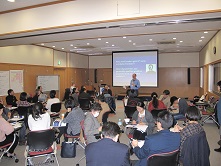
The fourth seminar was held in February 2018 in Tokyo with “Accepting the
others” the main theme. The objective of this round was to learn the skills
for mediation. 34 participants, including religious practitioners, NGO
staffs and students actively joined for the two-day seminar.
This round was more practical than the previous ones. It started with a
lecture by Dr. Kathy Matui on the theory and procedures of workshop building.
Participants learned necessary elements in setting up a workshop ranging
from reference materials to methodologies and objectives. Participants
were separated into four groups and tried to setup workshops by themselves.
Mr. Jon Rudy, a lecturer at the Elizabethtown University in the United
States, was invited to give a briefing on mediation. He explained a mediator
needs a tiered skill; he (or she) must have a solid base of self-recognition
and sincerity. Upon that base, one must have a skill of negotiation and
reconciliation among people, among groups, and among regions and nations,
he said.
He also explained about the step by step procedural approach. In the first
place, there must be a preparatory meeting. In this meeting, mediators
discuss if it’ll be possible to hold a meeting of the concerned parties.
Once such a meeting is held, then a follow-up meeting is also important,
he pointed out.
After the briefing, participants played a mediation roleplay and practiced
necessary skills to mediate. “It is extremely important not only to listen
to what the concerned parties insist, but to understand what they really
want to establish in solving a conflict,” Mr. Rudy stressed.
On the second day, participants made four groups. In each group, they discussed
issues such as happiness to practice various skills necessary for workshop
management. Dr. Matsui and Mr. Rudy gave suggestions and recommendations.
April 2018#5"Restoring Unity"
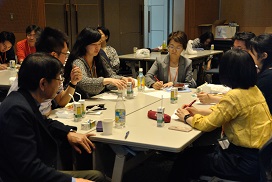
For the fifth round of the seminar, participants visited Fukushima city
in April 2018. Fukushima city is the capital ofFukushima Prefecture, one of the most heavily affected by the Great East
Japan Earthquake. Fukushima city is located inland, but the coastal part
of the prefecture was washed away by huge Tsunami which also triggered
the nuclear power plant disaster.
The two-day session looked into divisions and confrontations on community
level. 34 participants joined the seminar titled “Restoring Unity” to learn
to play a role in providing the people in divided communities with a sense
of unity.
The session started with a lecture by Mr. Shigeta Mimura, a lawyer in the
prefecture working with the people of Fukushima in liability lawsuits in
regard to the nuclear disaster. Participants also listened to the stories
of those who still live in temporary houses. On the second day, participants
visited the temporary houses in two groups and deepen their understandings
of the difficult lives of those residents, most of who were cut away from
their original communities.
July 2018#6"Setting up the Trend"
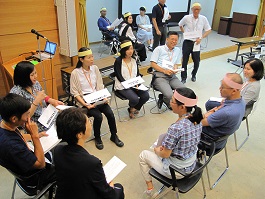
The sixth round of the seminar took place in Tokyo in July 2018 with special
guests from the Middle East.
The two of the guests were from Yezidi community in northern Iraq. Prince
Breen Tahseen, Representative Prince of Yezidi religion in Iraq and the
World (Head of the Supreme Council Spiritual Yezidi), and Dr. Khalaf Merza
portrayed difficult lives of Yezidi people who were under harsh oppression,
torture and attacks by the Islamic State terrorists group. Participants
listened to the presentation and later had a question and answer session
with the two guests.
Another guest, Prof. Mohammed Abu-Nimer, senior adviser to the King Abdullah
International Dialogue Centre (KAICIID) of Saudi Arabia, conducted a workshop
to experience how to overcome conflicts between different religions and
cultures. Dr. Matsui later joined him in another workshop to tackle with
such differences.
In another session, participants played roles in a simulation game of conflict
transference. They were assigned various roles in a conflict that involves
different ethnic and religious groups of people. The debate heated up,
according to a participant, and all recognized how difficult it is to reconcile
in actual conflicts.
September 2018#7"Go Beyond Boundaries"
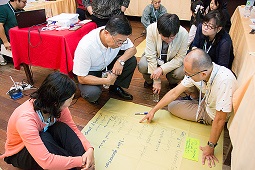
The seminar brought 19 participants to the Philippines in September 2018
as the seventh round of the program to learn from peace process in Mindanao,
where regional conflict between Christian and Muslim population continued
over decades.
On the first day of their six-day tour, Mr. Orson Sargado, Director of
Catholic Relief Services (CRS), gave a briefing on the activities of his
organization. CRS runs exchange program between Christian and Muslim children.
It provides displaced people with mental care. It also works on regional
development. Mr. Sargado explained the backgrounds of the conflict and
told the participants about the role of facilitators. He pointed out that
the conflict in Mindanao is not only that of religious confrontations,
but also based on inequality and social injustice such as land confiscations.
He explained that CRS defines its role as a “bridge” between the government
organizations and the civil society in order to let the voices of the suffering
people be heard. While trying to gain trust among the local population,
it also works hard to establish good ties with all stakeholders such as
government officials, religious leaders, military groups and educational
organizations. A facilitator needs a skill to construct multilateral relationships,
he emphasized.
The second day started with a lecture by Ms. Myla Leguro from Mindanao
Peace Institute. The institute is providing peace building trainings to
religious practitioners, government officials and NGO staffs in Asian countries.
In her lecture titled “Peace Building by Multiple Religions”, Ms. Leguro
pointed out that every religions preach common sense of peace. Religion
was often misused as a tool in confrontations, but can become a foundation
for peace, she said. Religious leaders must guide people toward peace,
she emphasized, and have a role of bringing up problems in religious communities
and regions to political and administrative arena. By doing so, they can
prevent conflicts and solve problems, she added.
Participants broke down to groups to discuss necessary elements of the
peace building, such as “factors”, “players”, “substantial approach” and
“principles”. Participants who discussed about substantial approach pointed
out the necessity to “confirm the will of concerned parties to dialogue”
and “encourage the parties to understand the faith and life history of
the other side”.
Listening to the discussion, Ms. Leguro showed what she calls the “3B”
approach for dialogue facilitation by religious leaders. First B is “Building”,
she said, “to heal your own wounds in the conflict and wipe away prejudice”.
The second B is “Bonding”, that means “to organize your organization and
create a foundation for interfaith cooperation”, to bring about the third
B, which is “Bridging” to “construct trust between different communities
to advance conflict resolutions,” she explained. She didn’t forget to add
the process is “easier said than done,” and suggested to be patient to
the participants.
On the third day, participants moved to Manila to meet with Dr. Lilian
Sison, Secretary General of RfP Philippines and Mr. Pablito Bong Baybado
Jr., Deputy Secretary General of RfP Philippines. Participants learned
about psycho-social programs for ex-child soldiers and victims of the conflicts,
and RfP Philippines’ approach to dialogue with the government and the military.
Participants visited Miriam College in Quezon City the next day to listen
to Dr. Loreta Castro, Program Director and the founder of the Center for
Peace Education, who is one of the most notable figure in peace education
and reconciliation by restorative justice in the Philippines. She spoke
about practical approach to solve problems not by punishment or demonizing
aggressors.
“I learned that we must have correct knowledge and strategy as well as
imagination to create peace. I just want to expand my network to deepen
my study for peace education,” one participant said in the end of the seminar.
“When I learned that the kids in Manila don’t know what’s happening in
Mindanao, I recalled the issue of Okinawa in Japan. We have to be aware
of social affairs,” the other said.
November 2018#8 "Initiating Actions"
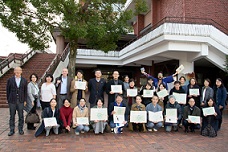
The eighth and the last seminar took place in Minamata city in Kumamoto
Prefecture in the southern island of Kyushu in November 2018. The main
subject that the 43 participants studied was tragic consequences of the
Minamata Disease, which is caused by mercury poisoning. They learned how
the disease caused by a local chemical company harmed the local residence
and divided local communities. They also learned about multiple efforts
by various stakeholders to heal those wounds and restore divided communities.
In a closing ceremony, Rev. Yamamoto gave certificates to all the participants,
saying that the conclusion of the seminar is “not a goal but a start,”
and he was “looking forward to your actions”. In her closing remark, Rev.
Kosho Niwano, a taskforce member, said “we can play facilitators’ role
because we have shortcomings and problems. Having problems is a sad thing,
but I would like to go forward with you to overcome those problems”.